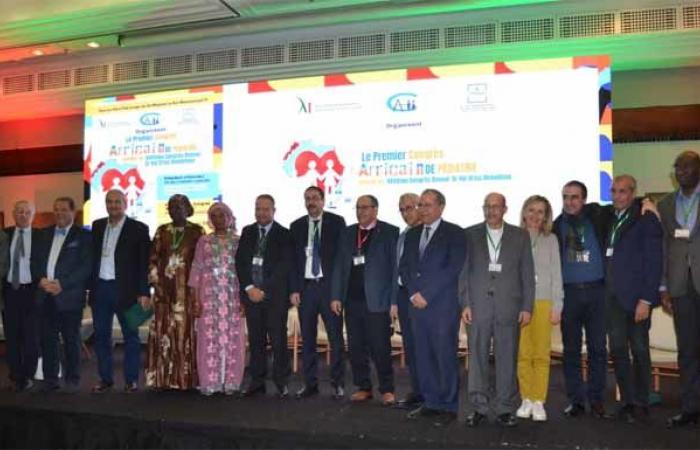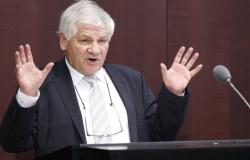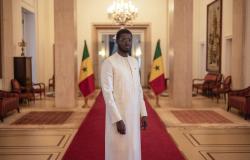The African Pediatric Prize Dr Abdellatif Berrada
was attributed to Diawara Idrissa,
professor of microbiology and molecular biology at UM6SS
The city of Casablanca hosted the first African Pediatric Congress, whose work ended on Sunday January 12, after three days of intense exchanges around crucial themes linked to the health of newborns, infants and children.
Paired with the XXVIth Annual Congress of Dr Haj Driss Benjelloun, this scientific event was organized by the Casablanca Association of Pediatricians in the Private Sector (ACPP), under the High Patronage of HM King Mohammed VI.
The inaugural session of this scientific congress was held last Friday early in the evening, in the presence of numerous presidents of African pediatric societies, representing their respective countries including Professor Ndeye Ramatoulaye Diagne, president of the Senegalese Pediatric Society.
Also taking part were the president of the Association of French-speaking Black African Pediatricians, Professor Mariam Sylla, the president of the United Associations of Pediatricians of the World (Joseph Haddad), the president of the World Pediatric Society and that of the Association of French-speaking pediatricians, bringing together more than 30 countries.
For three days, participants exchanged and shared their experiences on various themes through workshops, symposia and round tables devoted to various themes (allergology, infectious diseases, neonatology, vaccinology, dermatology, pulmonology, neurology, nutrition, etc.).
It should be noted that this first edition was organized in partnership with the Ministry of Health and Social Protection and the Mohammed VI Foundation for Science and Health.
Why such an initiative now?
Practitioners from Morocco, Africa and elsewhere also focused on medical advances and epidemiological issues as well as the challenges related to infant and pediatric health on the African continent.
Exchanges between pediatricians from Maghreb countries and sub-Saharan Africa have existed for a long time. But then, why did you wait so long to set up this laudable initiative for the health of newborns, infants and children on the continent?
Indeed, “we have always collaborated with our African friends. Today, we felt that the time had come to organize this first congress, because we were all ready to get started and take our destiny in our hands, as Africans,” said Dr. Afif My Saïd, co-president of the first African pediatric congress with Professor Adnaoui Mohamed, and president of the Casablanca Association of Private Pediatricians (ACPP).
Harmonizing practices for the well-being of African children
Coming from Libreville in Gabon to take part in this congress, Professor Simon Jonas Ategbo, pediatrician and president of the Gabonese Pediatric Society, for his part underlined the challenges of this initiative: “This first African congress has the essential objective of pooling the efforts of different African pediatric societies,” he confided.
Also, he continued, “in French-speaking black Africa, we already have an association which brings together all the pediatric societies. The same goes for the Maghreb countries. It is clear that we share the same themes and face the same problems. It is therefore necessary to harmonize our practices and approaches for the well-being of African children.”
It should be noted that this event was marked by the launch of the “Dr Abdellatif Berrada” African Health Prize worth 40,000 DHS. For this first edition, it was awarded to Idrissa Diawara, professor of microbiology and molecular biology at the Mohammed VI University of Sciences and Health (part of the Mohammed VI Foundation of Sciences and Health).
“I dedicate this recognition to our entire laboratory, to all our teams, as well as to all my masters. I would like to warmly thank the staff and team members of the microbiology laboratory at IBN Rochd University Hospital, as well as those of our pediatric infectious disease and allergology microbiology laboratory at Cheikh Khalifa Hospital and Mohammed VI University. he declared.
“We know that microbiology has made remarkable progress in recent years, particularly thanks to new techniques developed. Our research applied to infectious pediatrics has made it possible to set up genomic surveillance tools to evaluate the impact of pneumococcal conjugate vaccines.
This work, which mobilized a lot of effort, is today honored by this prize,” he confided.
Created in 1993 by a group of pediatricians, the Casablanca Association of Private Pediatricians of Casablanca (ACPP) aims, among other things, to strengthen the bonds of friendship and brotherhood among its members, and to facilitate the exchange of scientific information. or professional, establish contacts with other national or international Associations of Pediatricians of scientific organizations as well as to contribute to the progress and development of scientific or professional issues relating to their activities.
The members of this non-profit association “are represented by all pediatricians practicing in the liberal sector in the wilaya of Greater Casablanca”, underlines the ACPP.
Alain Bouithy
FRAMES (THEY SAID) :
Dr. Afif My Saïd, president of the first African Pediatric Congress
“This congress is fully in line with the Royal vision”
As we all know, His Majesty the King, may God help him, attaches particular importance to South-South cooperation. This congress is fully in line with this Royal vision, and we can only be proud of our country, which is hosting this first edition.
Two major achievements will mark this event. First, the creation of the African Pediatric Association, the first presidency of which will be held by Morocco. Second, the awarding of the African Pediatric Prize, which symbolizes the solid cooperation between Moroccan pediatricians and their African colleagues.
**
Professor Idrissa Diawara, winner of the African Pediatric Prize Dr Abdellatif Berrada
“I dedicate this distinction to young researchers who promote science, particularly in pediatric infectious diseases”
I have the honor of receiving this first prize awarded for the promotion of research. This award is a source of great pride, not only for me, but also for our team and our entire scientific ecosystem. I also dedicate this distinction to all the young researchers who, today, contribute to the influence of science, particularly in the field of pediatric infectious diseases.
I would like to express my deep gratitude to Professor Khalid Zerouali. Although he is no longer with us, rest his soul, he played a decisive role in the realization of this project. This prize is also a reflection of his scientific and human heritage.
A.B





